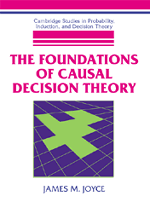Book contents
- Frontmatter
- Contents
- Preface
- Introduction: A Chance to Reconsider
- Chapter 1 Instrumental Rationality as Expected Utility Maximization
- Chapter 2 Decision Problems
- Chapter 3 Savage's Theory
- Chapter 4 Evidential Decision Theory
- Chapter 5 Causal Decision Theory
- Chapter 6 A General Theory of Conditional Beliefs
- Chapter 7 A Representation Theorem for Causal Decision Theory
- Chapter 8 Where Things Stand
- References
- Index
Chapter 6 - A General Theory of Conditional Beliefs
Published online by Cambridge University Press: 25 July 2009
- Frontmatter
- Contents
- Preface
- Introduction: A Chance to Reconsider
- Chapter 1 Instrumental Rationality as Expected Utility Maximization
- Chapter 2 Decision Problems
- Chapter 3 Savage's Theory
- Chapter 4 Evidential Decision Theory
- Chapter 5 Causal Decision Theory
- Chapter 6 A General Theory of Conditional Beliefs
- Chapter 7 A Representation Theorem for Causal Decision Theory
- Chapter 8 Where Things Stand
- References
- Index
Summary
If the suggestion made at the end of the previous chapter is right, then the main differences between causal and evidential decision theory have nothing essential to do with their underlying theories of value; all value is news value. The disparity between the two positions has to do, rather, with a difference of opinion about the correct epistemic perspective from which rational agents should evaluate their options. Evidential decision theorists believe that actions should be assessed as if they were ordinary pieces of information about the world, whereas causal decision theorists maintain that they must be viewed as potential causes of desirable or undesirable outcomes. To make either of these assessments, an agent must engage in an epistemic operation called supposition. Evidential and causal decision theorists both maintain that actions should always be evaluated under the supposition that they are performed, but they have rather different notions of supposition in mind when they say this.
Proponents of the evidential theory are speaking about supposition in the indicative or matter-of-fact mode. This process involves provisionally accepting some proposition as true in a way that preserves its evidential relationships. The hallmark of indicative supposition is that it never forces the supposer to revise any of her views about the “facts,” that is, propositions that she is certain are true. Causal decision theorists, in contrast, believe that people should evaluate their actions by subjunctively supposing that they will be performed.
- Type
- Chapter
- Information
- The Foundations of Causal Decision Theory , pp. 181 - 223Publisher: Cambridge University PressPrint publication year: 1999



